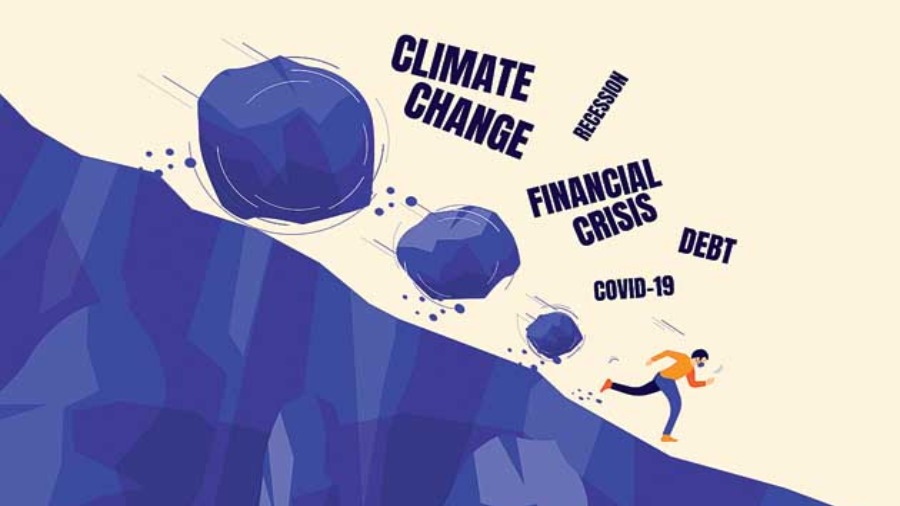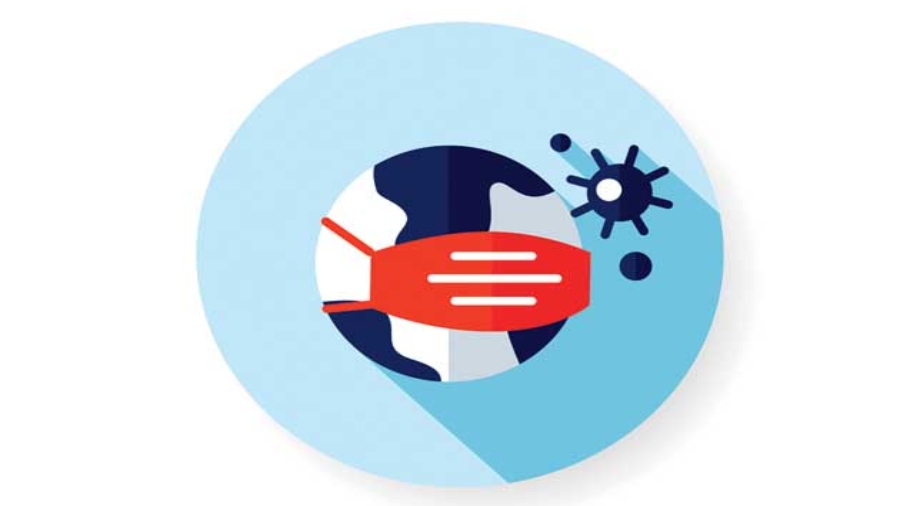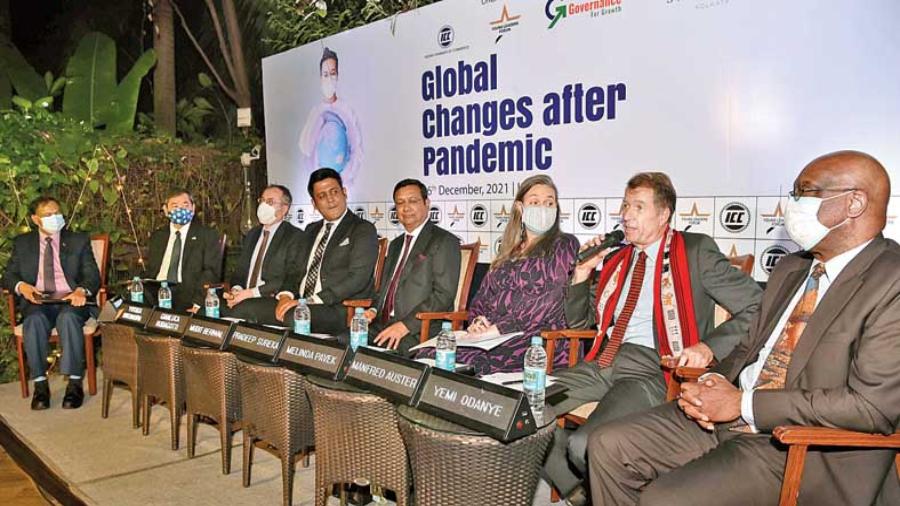A sizeable section of the city’s diplomatic community came on stage to reflect on “Global changes after the pandemic” at a programme organised by the Young Leaders Forum of the Indian Chamber of Commerce. Here are excerpts from their speeches:
Yemi Odanye, Deputy Head of Mission, British Deputy High Commission
The pandemic is a war that we, the international community, will win and must win. It has never been more apparent that global issues require global solutions, a big-tent approach to policy-making and implementation. It is that approach that our government took in the run-up to and at the recent COP26 climate summit in Glasgow. We, the international community, have finally brought the Paris agreement into force and have kept the goal of limiting the rise in global temperature to 1.5°C alive.
We must build our economies back better. We must not go back to the polluting technologies of the past. In two-thirds of the world, renewable energy is now cheaper than fossil fuel-generated energy. The power plants of the past are becoming stranded assets. This is a field in which India is showing leadership with initiatives like International Solar Alliance and its One Sun One World One Grid.
There will be other pandemics and we must be prepared. Biomedicine and nanomedicine have made immense advances in the last two years, driven by the need to respond to SARS and Covid. We must overcome anti-microbial resistance and have the opportunity to turbocharge the use of nanotechnology in cancer treatment.
Attaining the sustainable development goals will not be easy as the pandemic took us in the wrong direction. But what the pandemic has taught us about the power of partnerships and coordinated action will stand us in good stead.
Gianluca Rubagotti, Consul general of Italy
Italy was badly hit by the first wave. It was something unexpected and unknown. The second wave was not as severe as the first one. At this moment, compared to other countries in the neighbourhood, we are not doing too badly.
The pandemic has changed the way in which we work. It has introduced new ways of interaction, for instance the video calls. These will remain with us. It makes it easier to get in touch with companies at the other side of the world. Travelling has become more complicated. But it is no longer necessary to travel. So the issues that business people face with visa will no longer be there.

Eshor Raj Poudel, Consul general of Nepal
In end-2019, Nepal was set to celebrate Visit Nepal 2020, aiming to attract tourists from across the world. As director general, immigration, I was a member of the board. But when the pandemic broke out, my job suddenly changed to stopping people from coming in at the borders. The economy slowed down and tourism was badly hit. Freight and container costs went up. At the consulate, we have to clear and forward freight from third countries to Nepal. We are lucky that the supply chain remained intact. We thank the Indian authorities for that.
Millions of lives were lost, including over 10,000 in Nepal. Our government made Covid treatment and vaccination free. Though the unequal supply of vaccine was questioned by developing countries, we got global support in vaccination. Over 60 per cent of our population is fully vaccinated.
The worst effects of the pandemic were the societal disorders it caused, like quarantine and social distancing, which are against human nature and values.
Manfred Auster, Consul general of Germany
We can only go forward when we work together, be it COP26, the climate crisis or the pandemic. We cannot go back to where we were before the pandemic. Material growth will not be enough, it will have to be sustainable growth. The energy sector will have to be put on a renewable path. It will cost money but it will reap benefits and will lead to other innovations that we have no clue about at this stage.
Back in Germany, an era has come to a close with our chancellor Angela Merkel leaving office. Because of Green Party, the second largest party in the coalition that has come to power after the election, the government’s emphasis will be more on human rights, environment and climate change.
What does this mean for business? One of the last acts passed by Parliament before the election is on due diligence of companies in supply chains. That means every German company that is ordering or manufacturing in India will have to make sure that standards of human rights and environmental protection are adhered to in the entire supply chain. It comes into effect in 2023 and is something that Indian businesses will have to take into account in dealings with German companies.
Yutaka Nakamura, Consul general of Japan
About 1,450 Japanese companies are operating in India, including 400 or so in Haryana alone. Those state governments have developed industrial townships and offer attractive incentives to bring in investments.
You can attract Japanese companies to eastern India by creating a manufacturing base and integrate with global value chain by utilising demographic advantages.
Small and medium enterprises (SME) of Japan preferred to invest in China as also Vietnam, Thailand and the US. But when the pandemic broke out, they faced enormous challenge as China stopped supplyof raw materials and intermediate products. Now our government is advising Japanese manufacturing companies to relocate some units outside China and giving support for relocation cost. Covid has offered this window of opportunity to India.
But for Japanese companies, especially SMEs, the unpredictability of India’s policy changes makes it difficult to enter the Indian market. Also Japanese companies do not have much knowledge about Indian SMEs with whom they can partner.
Melinda Pavek, Consul general of US
The Biden administration has made combating Covid its top priority. I will stress on the themes of sharing, caring and preparing.
Our government has donated 370 million doses of vaccine to 110 countries through Covax or bilateral donations. It is the most donated by any country. We have shared data and research at various levels on how to create vaccine or how to treat Covid-19 and helped gather resources.
The US has invested $50 million in Biological E, a factory that will come up in Hyderabad to create additional vaccine manufacturing capacity as part of Quad, which involves India, US, Japan and Australia. The US has also donated $4billion to Gavi, (the vaccine alliance) which supports Covax and is helping WHO continue with research.
We have to take care of the vulnerable and marginal classes. Will women be able to come back to work? Will our LGBTQI colleagues get medical care? Will children be lured into forced labour or trafficking? All these situations have got worse due to Covid. We need to identify programmes to assist them.
There will be more Covid variants but we have learned not only how to change our supply chains, do things differently but also about the effectiveness of misinformation campaigns and how quickly people can lose sight of science and fall for inaccurate information. We must prepare for a future where these things continue to exist.

After the pandemic, cooperation amongst nations has improved and commitments towards fulfilling global promises are being implemented. The crisis is being turned into opportunity by global and national leaders, not just in politics but in business too. The government and the citizens are more aligned in their interests and activities. Each country has faced its own challenges and developed ways to mitigate them. We wanted to hear and learn from their representatives.
Pradeep Sureka, president, ICC
Each country faced the global changes after the pandemic in a different way. We chose this topic for discussion as we wanted to give the young generation ideas about what they need to do post-pandemic, knowing about the changes in other countries so that they can develop their businesses and grow.
Mudit Beriwal, chairman, ICC Young Leaders Forum
